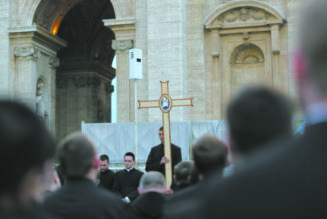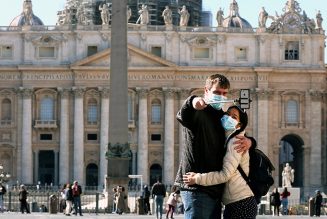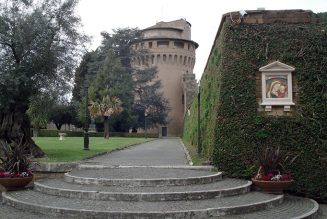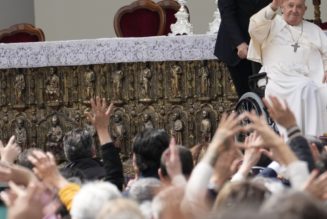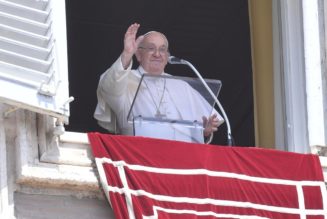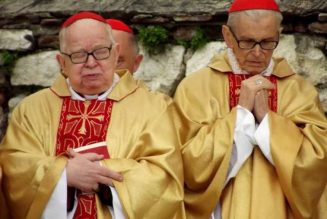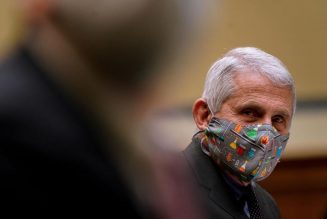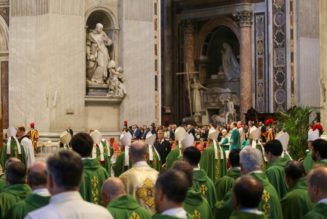At the Vigil Mass in the Holy Night of Easter in St. Peter’s Basilica, Pope Francis says Christ’s resurrection invites us to experience the immense surprise and joy of the women who witnessed the empty tomb, adding that we are called to relive the grace of our first encounter with the Lord to grow in faith and hope.
By Thaddeus Jones
Pope Francis presided over the traditional Easter Vigil in the Holy Night of Easter in a full Saint Peter’s Basilica on Saturday evening. The celebration started inside at the entrance of the Basilica with the evocative rite of the blessing of fire followed by the candlelight procession while Lumen Christi was sung and the Basilica lights came on in all their brilliance. The celebration included the baptism and confirmation of eight catechumens from Albania, the United States, Nigeria, Italy and Venezuela.
In his homily, Pope Francis underscored how the women who set out to visit Jesus’ tomb and found it empty underwent an incredible experience that marked a passage from the immense sorrow of over Jesus’ death to experiencing utter amazement over the Lord’s resurrection. And this journey from sadness to indescribable joy is one to which we are all called.
The Lord is Risen
Reflecting on the Gospel reading during the Easter Vigil, the Pope described how the women who set out to visit Jesus’ tomb saw their grief turn into amazement and joy after witnessing the empty tomb and the Risien Lord who calls the disciples in Galilee. He noted how the rebirth of the disciples and the resurrection of their hearts would call for them to return to their faith origins in Galilee.
From sorrow to joy
Sometimes we also can get overwhelmed with sorrow, the Pope observed, when we only see the present in terms of tombs of disappointment, bitterness or dismay, believing nothing can change.
And we can sometimes archive in our minds our first faith encounter with the Lord as something that belongs to the past and has less relevance in today’s difficult world marked by darkness, war, indifference and an uncertain future. This disillusionment, the Pope observed, can lead to the wellspring of hope drying up within us.
Memory that regenerates hope
The women at Easter became immediately transformed by their experience of the empty tomb and the Lord’s resurrection, the Pope explained. They ran away quickly, in part fearful but overwhelmed by joy to tell the disciples about this news “that will change life and history forever: Christ is risen!”
They also tell them about Lord’s summons to Galilee, where their life-changing experiences with the Lord began where He first called the disciples. The Pope said this signifies a return to “the grace of the beginnings, to regain the memory that regenerates hope, the ‘memory of the future’ bestowed on us by the Risen One.”
Moving forward with hope
The Lord’s resurrection motivates us to go forward in hope and joy, the Pope underscored, to “roll away the stone of the tombs in which we often imprison our hope” with full confidence for the future since Christ is risen and “changed the direction of history.”
The return to Galilee calls on us to return to “the grace of our own past,” the Pope suggested, in order to revive the memory of our experience of the Lord’s love and when we “received a radiantly new way of seeing ourselves, the world around us and the mystery of life itself.”
Remember your own Galilee
Remembering when we came to know the Lord personally, as God who is at our side who knows and loves us, is a key element here, the Pope explained.
When we remember our first encounter with the Lord, the foundation of our belief and faith, we respond to the Lord’s call to return to Galilee to celebrate the Risen Lord, to relive that experience, the emotions and sensations. This renews and strengthens our moving forward in the Risen Lord, the Pope emphasized, and rolls away the stone from the tombs of our faded faith or lost hopes.
“Remember and keep moving forward,” the Pope said, “and rediscover the grace of God’s resurrection within you!”











